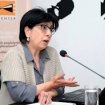Challenges to the Security of the South Caucasus Countries and NATO - 2016: Page 3 of 9
19 July, 2016
which means that NATO chooses one of the conflicting parties, and it is Azerbaijan. Of course, the wording seems harmless, but the proposal holds the orientation of the organization.
Vakhtang Maisaia - What the summit participants failed to achieve-is an interesting aspect for analysis. Here are the points summarized:
1) The so called "Black Sea Synergy” on forming Allied Fleet in the Black Sea by type of Soviet 5th Squadron, which operated in the Mediterranean Sea during the "Cold War" was not adopted. The Romanian side spoke about this initiative prior to the Summit and was immediately supported by the Americans and the British. However, suddenly Bulgaria spoke against the realization of the initiative. Though later it changed its position, but just then, during the summit Turkey suddenly spoke against the initiative as well, putting forward Montreux Convention of 1936 as an argument. Although prior to this Turkey remained silent and did not oppose the initiative. This happened just after Erdogan's apology to Mr. Putin for the downed plane. The geopolitical context is clear here. Moreover, after the coup in Turkey there was a message that Turkish pilots that shot down a Russian plane were arrested and even tortured.
Anyway, NATO officials defined Black Sea as a special responsibility zone in the final document.
2) The concept for fight against terrorism was not adopted during the summit, though prior to the summit, the experts were working on the text of the concept and the working draft of the document was developed. The document was not adopted due to unknown reasons.
3) The parties were undecided on NATO's further expansion and the acceptance of the new members on the example of Macedonia and Bosnia-Herzegovina, and could not come to a consensus on the issues of Georgia and Ukraine, despite of the attempts to include this issue in the agenda.
4) The participants of the summit could not formulate the vision of the new Strategic concept of the Alliance and formulate new updated strategic approaches after the Lisbon summit of 2010, when the version of the Concept was adopted. There were discussions on how to update the document considering the new realities of the international politics. However, this issue was laid off until the next summit, which as you know, will be held in Brussels next year and will be timed to the opening of NATO new headquarters.
In relation to Turkey – as a NATO member
Hayk Martirosyan - Turkey is a very sensitive issue for NATO member states. If not for the friendly relations and the US Air Force base in Incirlik, Turkey might have not stayed long in the Alliance. It has been more than a year that in Beltway lobbies they are demanding to start a process of Turkey’s removal from NATO, mainly due to Turkey's destructive position towards Syrian issue and because of the open support to ISIS and other Salafists in the region. These appeals are already heard at high levels, after the failed coup d’état attempt in Turkey,







 +37410 563363
+37410 563363
 1/3 Buzand Str, 8 Floor, Yerevan, Armenia
1/3 Buzand Str, 8 Floor, Yerevan, Armenia